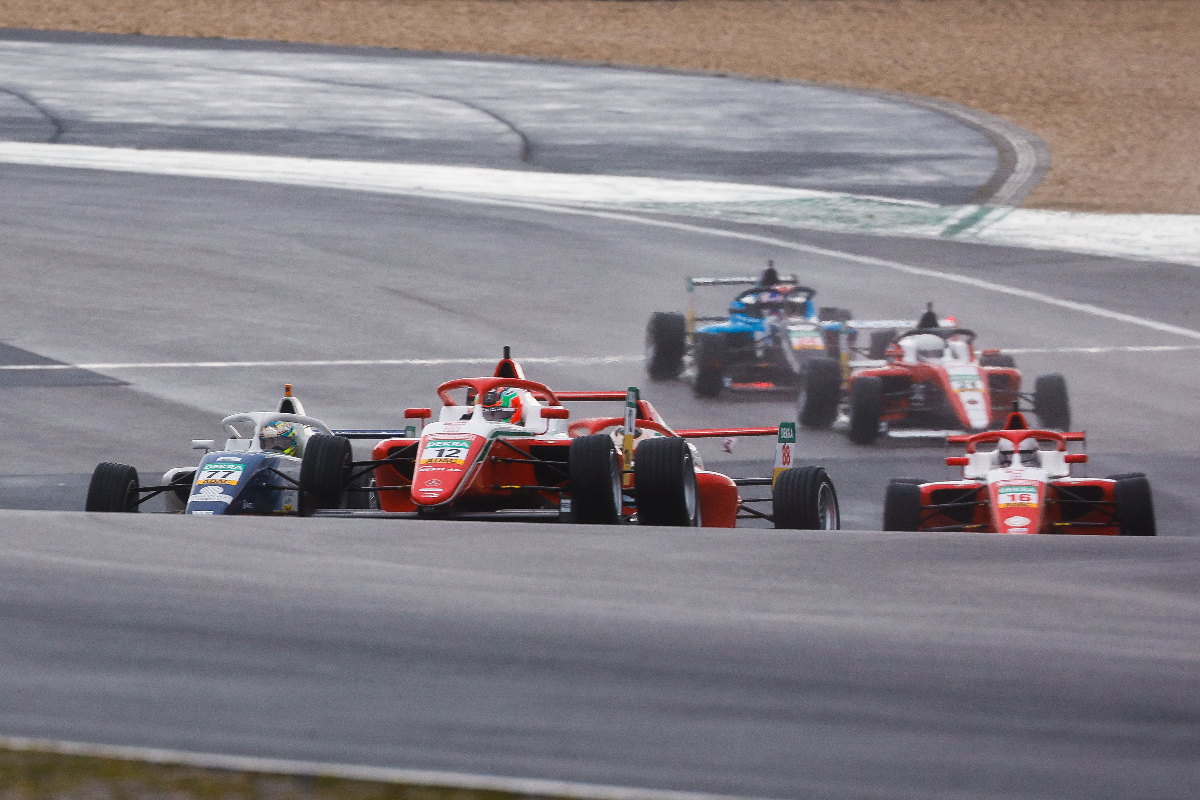
Photo: ADAC
Germany was home to motorsport’s most famous driver, most famous brands and two F1 grands prix in the 2000s. It also had a junior single-seater scene that has declined to the point of nothingness in 2023
After weeks of speculation, it was confirmed on Saturday that Germany’s national Formula 4 championship would not run in 2023 and the motorsport governing body in the country would instead support two drivers in French F4 for a season.
It is not the first time that the domestic racing scene has taken a heavy blow in recent years, and is the latest in a long chain of events that have showed how a motorsport-mad nation lost its place as one of the key countries to establish a racing career.
Sunday, July 28 2002
Team Ghinzani’s Jeffrey van Hooydonk wins the second race of the weekend at Hockenheim in round six of the German Formula 3 season. It was van Hooydonk’s only win of the year, and the last time F3 raced on the support bill of a Formula 1 race held in Germany.
Sunday, October 6 2002
After 36 seasons, the German F3 championship officially comes to a close at Hockenheim, with Swiss Racing Team’s Norbert Siedler taking victory in the final ever race before the series’ merger with the French F3 championship to form the DTM-supporting F3 Euro Series. That was to be run by a subsidary of DTM promoter ITR, while previous German F3 organiser Formel 3 Vereiningung e.V. created a new national F3 cup series.
The German F3 Cup ran from 2003 to 2014, and catered for previous-generation cars from 2008 onwards, while the F3 Euro Series morphed into FIA European F3 in 2012 and ran until the end of 2018.

Photo: GP2 Series Media Service
Sunday, July 31 2016
The last time that the secondary and tertiary tiers of single-seater racing officially raced on the F1 support bill in Germany. Both GP2 and GP3 raced at Hockenheim that weekend. Two years later there was a BOSS GP race at the German GP that included two last-generation GP2 cars.
March to September 2017
The FIA’s dream of ‘streamlining’ the route up junior single-seaters is put into action with a technical and commercial revamp of F3 that is to be implemented in 2019 with the creation of a new GP3-succeeding F3 championship on the F1 support bill and a new ‘regional F3’ that would be realised as Formula Regional.
ITR boss Gerhard Berger says he is willing to continue the European F3 series, which still holds at least nine races per year in Germany and remains open to multiple engine suppliers, outside of the FIA’s remit.
One battle is lost as the FIA marches forward with its vision for F3 with the organisation of Bruno Michel, who runs Formula 2 and GP3. Mercedes-Benz then decides it will leave the DTM after 2018, leaving ITR with far bigger concerns than F3.
Wednesday, March 14 2018
Spiess decides against supplying engines (which are branded as Volkswagen units) for the new FIA F3, as well as halting production of further European F3 units, but pledges to continue technical support for existing customers in Europe and Japan through to the end of the year. Losing an engine supplier makes it considerably harder for a European F3 continuation series to take place in 2019.
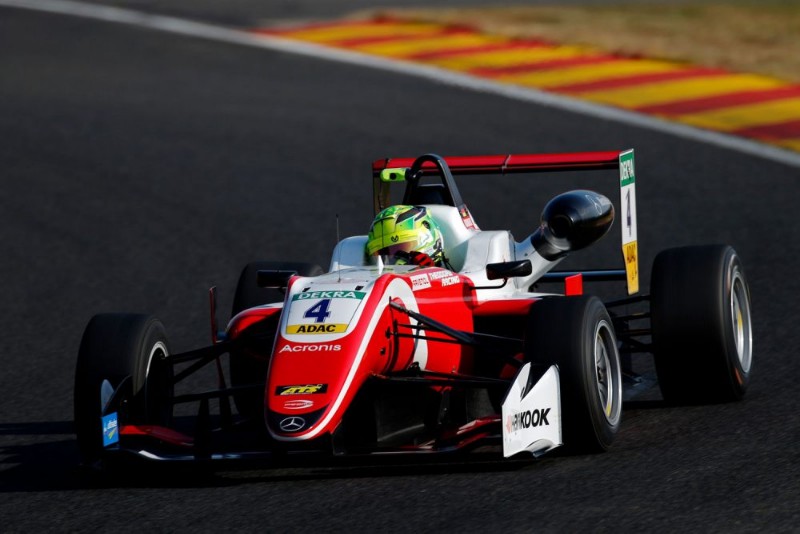 Wednesday, July 25 2018
Wednesday, July 25 2018
Berger makes his continuation plan official with a brochure handed out to all past and present European F3 teams. A few days later Mick Schumacher takes his first win in the championship, starting a run of success that ires some competitors and raises questions about the engine equality formula.
Friday, August 31 2018
Euroformula announces that it will open up its regulations to allow HWA (Mercedes) and Spiess (VW) engines from 2019 onwards, bringing it in line with European F3. Shortly after the Spanish-organised championship unveils a provisional calendar for the next year, the first F3 championship to do so, and commits to the existing Dallara chassis through to at least 2020.
A proposal for Dallara to build a successor chassis for 2021 which continues the ‘spirit’ of F3 is looked at by Euroformula, European F3 and Japanese F3. The concept would later be realised as the Dallara 320, an F3 car in all but name.
Friday, October 12 2018
Berger reveals a 2019 calendar for his successor championship, which includes five German rounds. But there’s bad news on the ‘Regional F3’ front in Germany as Renault Sport loses out to Italian F4 regulator Automobile Club d’Italia in the bid for the rights to the European championship.
Monday, October 15 2018
Renault still commits to running its Eurocup series in 2019, with multiple rounds in Germany, but drops its own Formula Renault 2.0 category to run the series with FRegional cars instead. Continued support to other FR2.0 championships is promised, and the German-run Northern Eurocup Cup has grand plans for 2019, but has closed its doors by December.
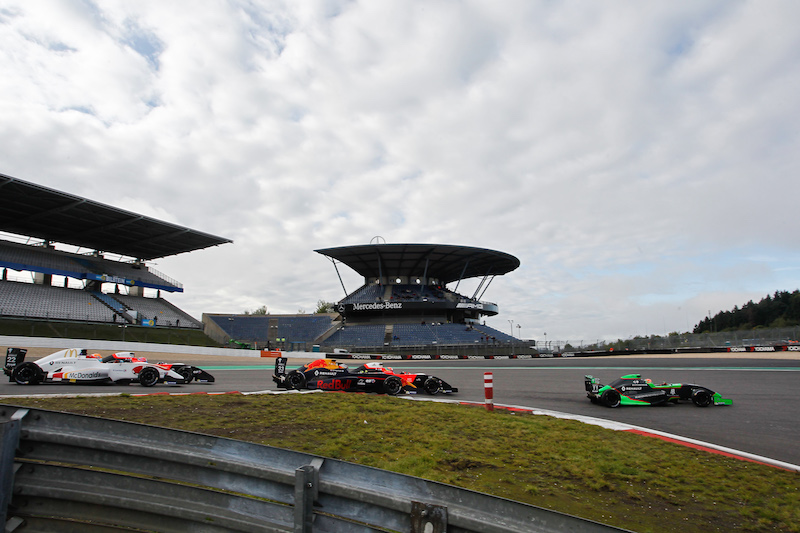 Wednesday, December 15 2018
Wednesday, December 15 2018
F3V GmbH settles on the Formula European Masters name for 2019 and receives a boost from the FIA when it chooses to award the champion 25 superlicence points, just five short of what the new FIA F3 awards and equal to FRegional European Championship and Super Formula.
Thursday, January 17 2019
Berger secures an enviable prize package for FEM, with the top three in the standings being handed spots in the DTM’s annual ‘Young Driver Test’, with the best of the trio getting a free race outing. The pipeline between what was the F3 Euro Series and the DTM not only helped maintain competitive grids in the touring car series but also provided opportunities with manufacturers for many young drivers that then helped them reach F1 or other professional series.
In contrast to GP3 and GP2, and even Japan’s manufacturer-filled single-seater ladder and the scholarship-funded Road to Indy, the connection between European F3 and the DTM stands out as the most effective in car racing for taking drivers from junior series and preparing them for and providing opportunities to become professional drivers.
Friday, March 22 2019
The FEM entry list sits at six cars, and with three days to go before its first scheduled test at Misano, Formula Scout breaks the story on the decision to bring an end to the championship.
The cancellation is made known to the press prior to the drivers, causing some acrimony for those headed to Misano. Several teams head over to Euroformula with their cars.
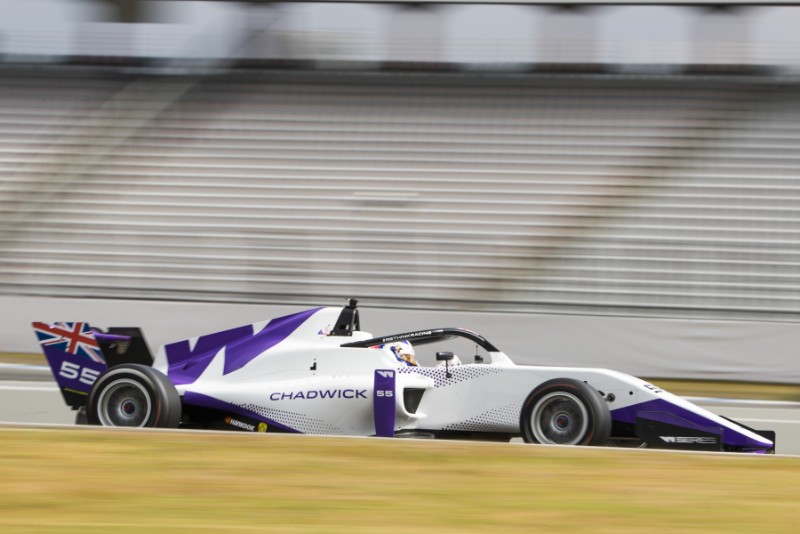 Sunday, May 4 2019
Sunday, May 4 2019
A historic moment as the first ever W Series race is held at Hockenheim and won by Jamie Chadwick. The new all-female FRegional series adopts the DTM support series status FEM would have had, and
Sunday, May 26 2019
Remarkably, the last time contemporary F3 cars have raced in Germany in any capacity. Euroformula had already decided on going to Hockenheim for 2019 long before Formula European Masters’ creation and then cancellation, and attracted HWA and Spiess-powered teams that had intended to race in Germany.
Although there was a fun weekend of racing, with the two races won by Marino Sato and future F1 driver Yuki Tsunoda, the event attracted next to no spectators and Euroformula would not visit Germany again. But not for lack of trying.
Saturday, July 6 2019
W Series’ second German round is another historic moment, the last race to date for single-seaters at the Norisring street circuit. Marta Garcia wins from pole.
Sunday, July 28 2019
The most recent addition of the German Grand Prix marked the last time junior single-seaters supported F1 in the country, with ADAC F4 holding two races at Hockenheim that were won by Dennis Hauger and Arthur Leclerc.
When F1 returned to Germany in 2021 for the Eifel Grand Prix, there was a double blow for young drivers. The first was an absence from the support bill, and the second was inclement weather leading to the cancellation of the first F1 practice session which several Formula 2 drivers were supposed to take part in.

Photo: Alfa Romeo Racing
Thursday, March 5 2020
ADAC F4 changes the date and location of its season-closing round to avoid a clash with Italian F4’s season finale. Many of ADAC F4’s drivers and teams compete in Italy too, and it was originally scheduled that the German series would finish at Sachsenring on October 2-4, the same weekend Italian F4 was due to conclude at Mugello.
The change of dates removes Sachsenring from the ADAC F4 calendar entirely, with no other available dates at the circuit for the series to race at, and a departure from the ADAC GT Masters support bill in leau of a NASCAR Whelen Euro Series support slot on Hockenheim’s National layout.
Although the 2019 season is a thriller, which Sauber even enters its own junior team into, by the start of 2020 there are already signs that ADAC F4 will end up having a dependancy on Italian F4 to maintain international relevance. Particularly too now that Germany is now a nation without its own F1 grand prix.
Monday, March 9 2020
As the COVID-19 pandemic starts to take hold in Italy, but not in northern Europe, series start looking to circuits in the top half of the continent to hold races should events further south prove unable to go ahead. the FR Eurocup cancels its Monza season opener and joins the DTM at Hockenheim.
Thursday, May 21 2020
The pandemic spreads, and all of German motorsport is put on halt. That means W Series loses its season opener at the Norisring, while the provisional slot Hockenheim holds on Euroformula’s calendar is dropped after the circuit starts prioritising talks with F1 to host a grand prix in its heavily delayed and redrawn season schedule.
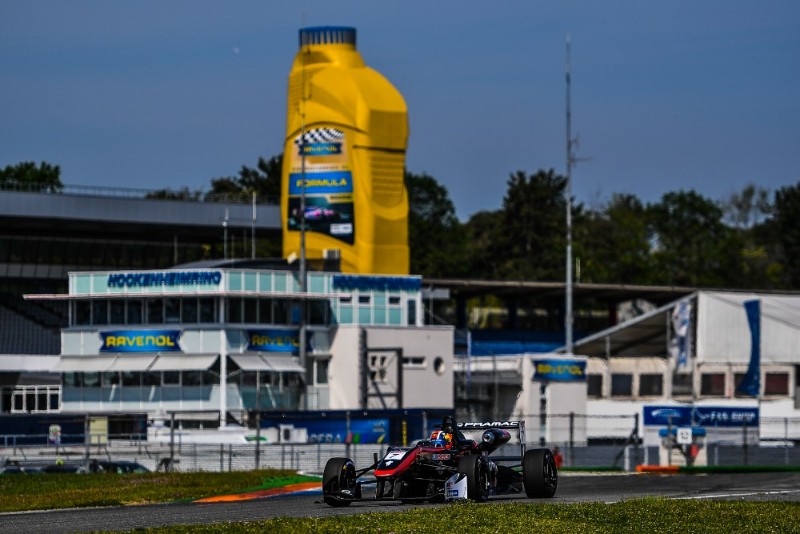
Photo: Fotospeedy
Those talks ultimately fail, leaving Hockenheim without several series it otherwise could have hosted once motorsport gets back underway. But truly the death knell for the track in hosting international racing is the high cost it sets for visiting series.
Sunday, May 24 2020
A new ADAC F4 calendar is released, but it brings date clashes with Italian F4. However with racing still looking unlikely to return to Italy as fast as it will in Germany, it does not look to be too great an issue for the series.
Friday, November 6 2020
The DTM finalises its switch from Class One touring car regulations to becoming a GT3 sportscar series for 2021 and its two decades-long tradition of being supported by a Formula 3 (or Formula Regional) series is ended by W Series deciding to support F1 in 2021.
On the support bill now is the GT4-spec DTM Trophy, a championship intended to be a platform for young drivers in the same way European F3 was. But the DTM’s switch to sportscars ends the era of manufacturer works teams and it becomes a series populated by privateer operations without the investment or long-term ambitions to support young drivers in lower categories.
Formula Scout speaks to Berger and several DTM drivers who drove in F3 beforehand on how they think this will impact the relevance of the DTM for young drivers and what it will do to the country’s racing scene.
Saturday, February 20 2021
ADAC F4 attracts a new team, BWR Motorsports, run by ex-Team Rosberg DTM man Erich Baumgartner. The father-and-son combination of Sauter Engineering+Design also joins the series as a one-car entry.
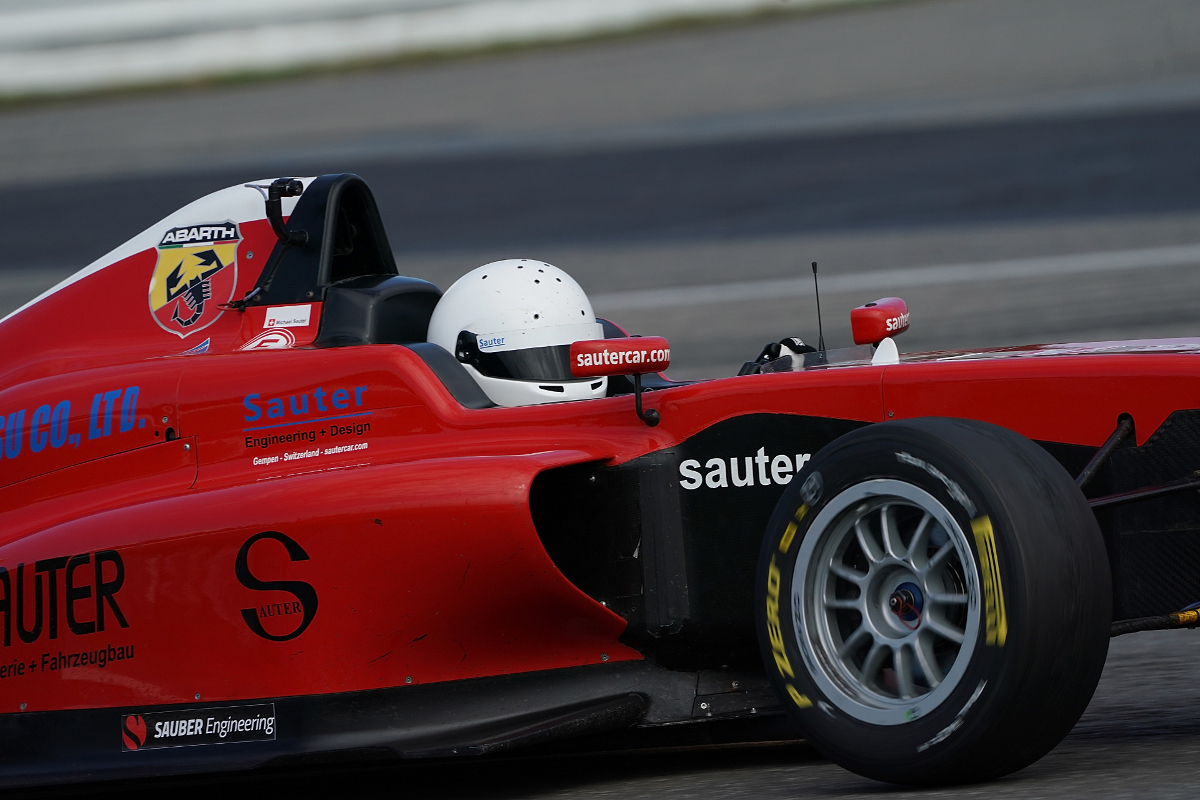 Wednesday, March 3 2021
Wednesday, March 3 2021
ADAC F4 brings forward its Oschersleben season opener by a month to avoid running on the same weekend as Italian F4’s season opener. Van Amersfoort Racing prioritised the German series in 2020 and took the title as a result. This year the team aims to do the full ADAC schedule, and is yet to decide on how much of the more competitiove Italian championship it will do.
Saturday, October 2 2021
The pandemic leads to Oscherlseben’s round being cancelled, and the season begins with well-contested races in Austria and the Netherlands. But once ADAC F4 goes to Germany, interest sinks. There are 13 cars at Hockenheim, then only eight drivers take part in race one at the Sachsenring. When the eastern German track was last visited, the grid had been twice that size.
The ADAC and teams talked to Formula Scout afterwards about why the event attracted such a small entry list. FIA regulations prohibit what are considered national championships from running more than two “foreign” rounds, which means a maximum of two F1 tracks on the calendar for ADAC F4 but up to four for Italian F4.
Saturday, October 23 2021
ADAC F4 announces it will adopt Tatuus’s second-generation chassis for 2022, and continue with Abarth-badged Autotecnica engines and Pirelli tyres. This keeps the series in line with Italian F4.
Monday, November 8 2021
The 2022 calendar is unveiled and the Red Bull Ring is swapped out for Spa-Francorchamps as a ‘foreign’ round. Oschersleben and Sachsenring are dropped from the schedule to try to make the series more appealing, with both tracks not used by any single-seater series above F4 and now not at the entry level either.
 Sunday, November 28 2021
Sunday, November 28 2021
Long-time ADAC F4 team Mucke Motorsport announces it will move into the DTM Trophy, but also leave single-seaters at the same time. Peter Mucke started the team in 1998 to run in Formula BMW ADAC, and he spoke to Formula Scout about what led him to stop running cars in junior series.
Sunday, March 27 2022
Another new team commits to ADAC F4, and does so with four cars. PHM Racing and Jenzer Motorsport end up being the only two teams, along with effective privateer Michael Sauter, do the whole season.
Friday, December 2 2022
FREC’s 2023 calendar is finalised and includes a round in Germany for the first time with a trip to Hockenheim on October 21/22.
Saturday, December 3 2022
The ADAC puts out a statement saying it “will not be accepting entries for ADAC F4 for the 2023 season”, and announces it will support two drivers’ entry into French F4 for the next year.